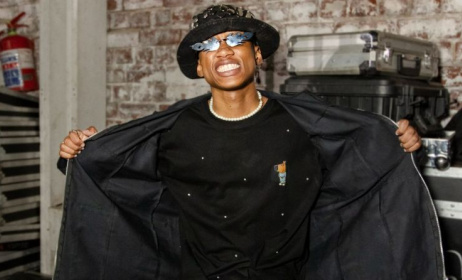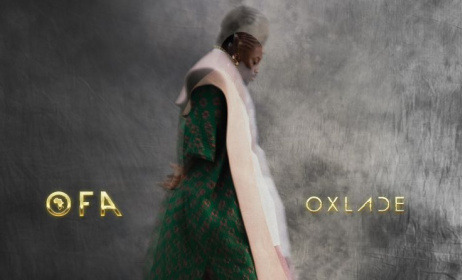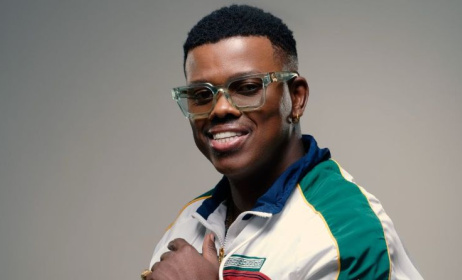Estère: Culture defines the parameters of my perspective
Estère is a New Zealand-based musician who has created a sound constructed around her love for language and culture. Born to a Cameroonian father and a New Zealander mother, Estère describes her sound as "electric-blue, witch-hop music" – a result of electronic, folk, hip hop and R&B influences. Her sound captured the attention of one local publication, which labelled it a mixture of “everything the music world is lauding and lusting after right now.”
 Estère. Photo: Paascalino Schaller
Estère. Photo: Paascalino Schaller
Her 2015 eponymous debut album earned her praise from prominent media outlets such as Disco Naïveté, Elle Magazine and Portals. Her second album My Design, On Others’ Lives (2018), cemented Estère's presence on the global music scene, with Afropunk calling it “an immersive experience unlike anything you’ve ever witnessed.”
The ‘Control Freak’ singer has opened for big artists like Grace Jones and Erykah Badu. She has also played at major international festivals such as Glastonbury (UK), Afropunk Paris (France), MTN Bushfire (eSwatini), WOMAD (New Zealand), Aarhus Festuge (Denmark) and Sori Festival (South Korea), as well as at sold-out club shows in the UK, France and New Zealand.
Music In Africa caught up with Estère ahead of the release of her single ‘Calculated Risk’ this week.
MUSIC IN AFRICA: What subject do you address in ‘Calculated Risk’ and what inspired the title of the song?
ESTÈRE: ‘Calculated Risk’ is all about paralysing myself with fear of failure and trying to move past that. I know that I can really play it safe because I’m petrified about what will happen if I take a chance and make myself vulnerable. I’m trying to liberate myself from that, but it’s an ongoing process.
Tell us more about the artwork of your single?
I commissioned the single artwork from a New Zealand artist called Rosa Friend. I asked that she work with some of the archetypal symbols around the idea of women taking risks. For example, Eve in cahoots with the serpent, and the story of Lilith, and she came up with an amazing image. The music video was made by director Paascalino Schaller. The first time we made a music video together was actually in South Africa. I got some funding and then we did a real guerrilla-style shoot in Betty’s Bay close to Cape Town for my song 'Grandmother' while I was touring.
What motivates you?
I’m motivated to try to understand the world around me through music. I’m so in awe of being on this Earth, but there is so much intense stuff to make sense of too. Music makes me feel present and connected to nature. It just let whatever I'm trying to come to terms with propel what I make. Collaborating with other artists has also influenced my work more and more and working with different musicians opens up a whole lot of new worlds.
What influences the sound and language of your music?
I’m influenced by any music that creates sonic environments, music that transports you to a forest in Seattle, the Sahara, a nightclub in London and someone’s lounge where they are just messing around with beats. I’ve written a little bit in French because I feel connected to that language – half of my family speak it. But English is my mother tongue so I use that dominantly.
Your father is from Cameroon and you were born in New Zealand. Assumedly, there was a cross-cultural approach involved in your upbringing. What role does culture play in your music?
I think culture defines that parameters of my perspective. Being a minority in New Zealand and a half-Cameroonian girl has deeply informed my thirst to identify the differences and universalities between people.
What impact has the COVID-19 pandemic had on your artistic work?
At the moment I can’t tour internationally, which makes me sad. But I’ve had a lot of time to get to know my new cat, which has been artistically inspiring because he’s such a quirky kitten and makes me remember to take each day as it comes.
What do you consider before releasing music during the COVID-19 pandemic?
I suppose I’ve had to think a lot about how I will promote the album when touring outside New Zealand. It’s interesting to see the innovative approaches that lots of musicians quickly took up, like the livestreaming of concerts. A stand-out example of that was Erykah Badu’s Apocalypse series. That was bold!
How has the New Zealand government responded to the COVID-19 pandemic for the welfare of musicians?
The New Zealand government has released financial aid for small businesses and people who are ‘sole traders’, which a lot of musicians are. There has also been really clear leadership, so we have been aware of what and why things are happening at every stage of the lockdown.
When will you resume touring and what does your calendar look like?
I’ll be getting back on the road at least in New Zealand from October. I’m going to be playing a bunch of arts festivals and summer shows. I really hope to be able to tour Africa and Europe next year, but that still feels like a distant dream at the moment.



































Comments
Log in or register to post comments